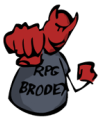Corporate satire in games isn't funny anymore
Rather than laugh, now I just feel sad.
To those who believed that videogames can't be funny, 2019 proved them wrong. The nihilistic absurdity of
What the Golf! and the mischievous avian bants of PC gaming's favourite honking monster in
Untitled Goose Game made up for whatever Borderlands 3 was trying to do with its scatological script.
The Outer Worlds
should've been up there for me, too. I love the dark humour of Fallout, but something about Obsidian's latest effort left me cold. I stopped playing way before finishing it, despite it being relatively short for an RPG. That was the case due to various factors, but it wasn't just down to my backlog forcing me into my nightly 9 pm paralysis, which invariably leads to Skyrim.
No, it was its attempts at humour that hindered my curiosity to explore the rich and colourful Halcyon system. I'm not referring to the hilariously 'dumb' character builds you can create, but the parody of evil corporations that characterises this troubled part of the galaxy.
Early on you encounter Spacer's Choice: the faction that runs the towering Saltuna Cannery in the first major settlement, Edgewater. Here, graves are leased to the deceased and the company are paid compensation by those closest to them in the event of a suicide. Sick leave requests take weeks to process.
I quickly found the 'aren't big companies bad, haha' brand of jokes tiresome. Meanwhile, Journey to the Savage Planet's jests rubbed me up the wrong way, in precisely the same way. Like the factory workers of Edgewater, the explorers scouring the galaxy for humanity's next habitable planet on behalf of Kindred Aerospace are also treated as expendable property. After a laundry list of potential risks its staff could contract, ranging from nausea, feelings of emptiness, and death, travellers are urged in the event of an emergency to "contact your Kindred representative as soon as possible" with the caveat: "current rescue times exceed six months."
I'm fairly certain that, had I played both games a few years ago, I'd have laughed along as intended. Perhaps I'm just older now. But, at the same time, the world has changed. The richest 1 percent on Earth
own more than double the wealth of 6.9
billion people. Amazon factory workers, without time for breaks, resort to
relieving themselves in plastic bottles. People need their Alexas the day after they order them, after all.
The late-capitalist hellscapes that The Outer Worlds and Journey to the Savage Planet try to ridicule are not hypothetical situations lurking in the future. They exist today. As a result this satire just bounces harmlessly off its targets; it no longer has bite, and therefore, it isn't funny.
Corporate satire in videogames is missing something: hope. Satire needn't be throwaway slapstick like 2019's not-golf game, and the anti-social goose game. It can be constructive; created with the idea that a better future is possible.
If you're anything like me, you'll feel the world is pulling you, unwittingly and inexorably, in the wrong direction. Most jokes designed to undermine the powers that make that possible merely remind me of that situation. At best, I just roll my eyes whenever videogames cheerfully present their working characters as company property or make light of inequality and injustice. Mostly, I just feel sad.






































